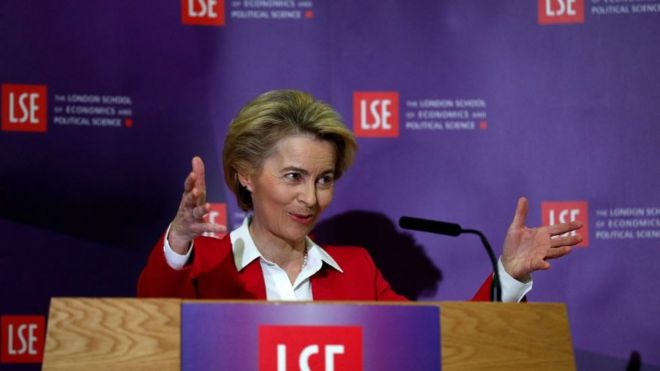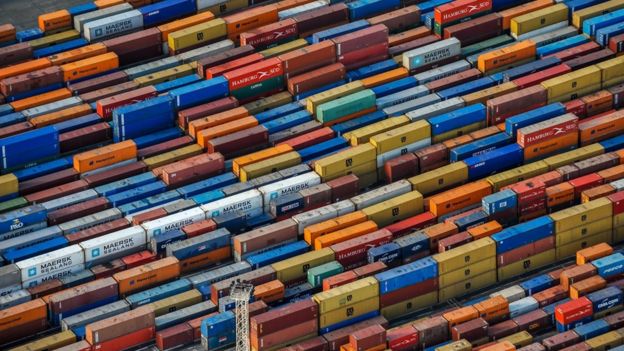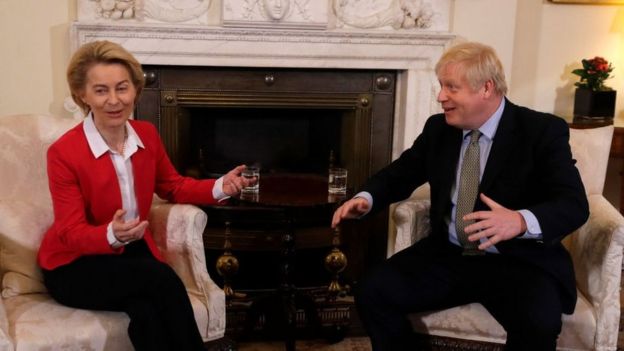 GETTY IMAGES
GETTY IMAGES
"Without a level playing field on environment, labour, taxation and state aid, you cannot have the highest quality access to the world's largest single market," European Commission President Ursula von der Leyen said in a speech at the London School of Economics.
She was talking about what kind of access the United Kingdom could have to the European single market after Brexit.
It is a question set to dominate negotiations on a post-Brexit trade deal, which will probably begin about a month after the UK's departure from the European Union (EU), on 31 January.
And the answer depends, to a large extent, on what's known as the level playing field.
To what does a level playing field refer?
It is a trade-policy term for a set of common rules and standards that prevent businesses in one country undercutting their rivals and gaining a competitive advantage over those operating in other countries.
In other words, it's about fair and open competition - and it's an important part of the EU single market (in which member countries allow the free movement of people, goods, services and money).
Part of a trade negotiation is working out how widespread level playing field provisions should be.
But the areas in which the EU is most insistent they must be maintained are:
- workers' rights
- environmental protection
- taxation
- state aid (or subsidies for business)
 GETTY IMAGES
GETTY IMAGESIs the EU trying to make the UK a special case?
Yes and no.
On the one hand, almost all trade agreements involve level playing field provisions, because all parties are keen to ensure their businesses aren't operating at a commercial disadvantage.
And the closer a trading relationship is, the stricter those rules become.
But the EU is also taking other factors into account - notably, that the UK is one of the world's largest economies and is right on its doorstep.
The political declaration that sets out the framework for the future relationship between the EU and the UK makes this link explicit.
Given the "geographic proximity and economic interdependence" of the two sides, it says, the future relationship must include "robust commitments to ensure a level playing field".
What this means in practice is if the UK wants a trade deal that involves zero tariffs (no taxes on goods crossing borders) and zero quotas (no limits on the amount of goods that can be traded), the EU will expect it to sign up to stricter rules than those set out in other recent EU trade agreements with countries such as Canada or Japan.
It's because there is far more trade involved and the stakes are higher.
What are the options?
Prime Minister Boris Johnson has said he wants a zero-tariff zero-quota deal but also insists on the UK's right to diverge or move away from EU rules and regulations when it wants to.
So that could mean sticking close to EU rules in some areas but not in others.
The EU adds a third zero to the equation - "zero dumping", which means the strictest level playing field rules it can negotiate.
One option is to have what are known as non-regression clauses, which means the two sides would agree not to water down the shared rules they currently have.
Another, tougher, option is to insist on what's called dynamic alignment, which would mean if the EU changed its rules in the future, the UK would automatically make the same changes.
 GETTY IMAGES
GETTY IMAGESAnd that's partly what the trade negotiations will be about?
Yes. And both sides are - predictably - digging in a bit.
The early signs are a number of EU countries, including those that do a lot of trade with the UK, are taking a tough line and insisting on dynamic alignment in several policy areas, including state aid and environmental regulations that affect businesses.
But that won't be acceptable in London. Last week, Chancellor Sajid Javid told the Financial Times: "There will not be alignment, we will not be a rule taker."
Former Prime Minister Theresa May's initial version of the withdrawal agreement with the EU contained a series of legally binding level playing field provisions within it.
Boris Johnson's version doesn't - it relegates most of those rules (apart from some that relate to trade between Northern Ireland and the EU) to the non-binding political declaration.
So agreement on a level playing field regime is going to have to be negotiated before the end of the post-Brexit transition period, in December 2020.
And it is fair to say the two sides will begin a long way apart.
Not only is there disagreement on what should be covered, there is also no meeting of minds yet on how any future disputes should be resolved.
It's another reminder that, after Brexit, the UK will remain a friend and partner of the EU but it will also become a rival.
https://www.bbc.com/news/51180282